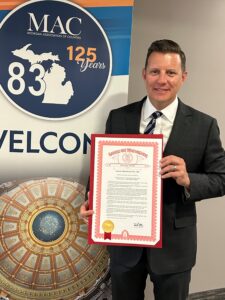Fee authority for courts likely to expire without legislative intervention
 Legislation to secure key trial court funding still awaits a vote on the House floor.
Legislation to secure key trial court funding still awaits a vote on the House floor.
House Bill 5392, by Rep. Sarah Lightner (R-Jackson), extends a quickly approaching May 1, 2024, expiration (“sunset”) of the authority of trial courts to levy fees that constitute a key part of their operational funding.
However, HB 5392 is “tie-barred” to a separate measure through actions of the House Judiciary Committee. The companion bill, HB 5534, by Rep. Kelly Breen (D-Oakland), outlines a plan for the State Court Administrative Office to conduct data collection on certain trial court costs and revenue sources and provide a report to the Legislature with proposals to implement the Trial Court Funding Commission’s recommendations from 2019. A “tie-bar” means both bills must advance together.
MAC sees broad support for the sunset extension, but the prospects for the companion bill are much less clear. If, for political reasons, the legislation is delayed and not signed before May 1, a funding gap will result.
As we approach May 1, and the bills have yet to receive a vote, it is increasing likely fee authority for courts will expire. Courts stand to lose nearly $50 million in operational funding annually if HB 5392 does not pass. This loss of revenue, if not covered by the state, will fall on the counties to cover.
With the likelihood for the fee authority to expire, the State Court Administrative Office sent a memo to courts last week, encouraging them to work with counties to establish a back-up funding plan.
While we are expecting the authority to expire on May 1, MAC anticipates the bills will still be signed in May. MAC is advocating for state funding to be appropriated to counties in the event a funding gap is created, to the tune of $1 million per week.
MAC supports both HB 5392 and 5534, with our priority to move HB 5392 and extend the funding authority prior to May 1.
MAC is asking members to take immediate action to urge quick legislative passage. Please visit MAC’s advocacy center to share your support for HBs 5392 and 5534 with your elected officials. The legislative window is closing, as there are limited days for the Legislature to advance the bills to the governor prior to May 1.
For more information on this issue, contact Samantha Gibson at gibson@micounties.org.

Executive Director Stephan Currie with official County Government Month resolution.
Legislative resolution recognizes ‘County Government Month’
April has been designated National County Government Month in Michigan after the Senate approved a resolution this week.
Resolution 105, by Sens. Jeff Irwin (D-Washtenaw) and Sylvia Santana (D-Wayne), was requested by MAC as part of National County Government Month festivities led by the National Association of Counties. Irwin is a former Washtenaw County commissioner and a member of MAC’s County Caucus.
This recognition is an opportunity to highlight the hard work of county officials and the multitude of services county governments provide. Since 1991, the National Association of Counties has pushed for all states to celebrate counties throughout the month of April.
Impact on counties of federal PFAS rule as yet unclear
The federal government has issued new drinking water standards pertaining to Per- and Polyfluoroalkyl Substances (PFAS). The U.S. Environmental Protection Agency (EPA) announced this week the “first-ever national, legally enforceable drinking water standard.”
There are 66,000 public drinking water systems in the U.S. and the EPA estimates that between 6 percent and 10 percent of those systems will need to take action to meet the new standards. The federal government has made available $1 billion in funding to test and treat both private and public water supplies for PFAS.
Michigan has been a national leader in PFAS testing and treatment since at least 2017 with the creation of the Michigan PFAS Action Response Team (MPART). While MPART has already sampled every public drinking water system in the state, it is not yet publicly known how many, if any, will be impacted by the new standards.
For more information on MAC’s environmental policy work, contact Madeline Fata at fata@micounties.org.
Trial court legislation still stuck in Lansing calendar, Podcast 83 reports
 With legislators returning to Lansing this week, focus again turns to the overdue action on the authority of trial courts to levy fees, MAC’s Samantha Gibson told her fellow Podcast 83 team members in the group’s newest episode.
With legislators returning to Lansing this week, focus again turns to the overdue action on the authority of trial courts to levy fees, MAC’s Samantha Gibson told her fellow Podcast 83 team members in the group’s newest episode.
“So, at this time, unfortunately, we’re still held up on trial court funding legislation in the House,” Gibson said. “What’s becoming increasingly likely, and what I think will end up happening, is once the two vacant house seats are filled after those special elections, April 16, maybe. So, let’s say April 23 or 24, maybe the House will vote the bills out, then the Senate is going to have a hearing on some Senate versions of those bills on the 18th. So, whenever the House bills get over there, they can just get sent right to the Senate floor. … We probably will be looking at a week or so after May 1 for implementation of the new sunset.”
In that case, MAC will be pressing the state to reimburse counties for the approximately $1 million per week that will be lost in operating revenue, as it did the last time the fee authority expired in the fall of 2022.
Also reviewed in this week’s episode are:
The potential effects of legislation just signed by Gov. Gretchen Whitmer on hotel/motel tax authority for Kent and seven other counties.
The timing for the passage of the state’s FY25 budget this spring with the statewide election calendar looming.
View the full episode, recorded on April 8, by clicking here.
Previous episodes can be seen at MAC’s YouTube Channel.
And you always can find details about Podcast 83 on the MAC website.
April 16 webinar set on harm reduction and opioid treatment meds
 On Tuesday, April 16, the next webinar in the Opioid Settlement Technical Assistance Learning Series will be held from 1 p.m. to 2:30 p.m., titled “MOUD & Harm Reduction.”
On Tuesday, April 16, the next webinar in the Opioid Settlement Technical Assistance Learning Series will be held from 1 p.m. to 2:30 p.m., titled “MOUD & Harm Reduction.”
Many people have negative reactions when they hear “methadone” or “needle exchange,” but these are two of several science-backed ways to improve health and prevent deaths among people who use drugs. This presentation provides a broad overview of two kinds of interventions that science shows can help people who use drugs: medications for opioid use disorder (MOUD), sch as methadone, and harm reduction, which includes services like needle and syringe programs. We will explain how these interventions work, show evidence of their effectiveness, and address common misconceptions about them.
Register to attend here.
The series is hosted by the Michigan Department of Health and Human Services, in partnership with Michigan State University, University of Michigan and Wayne State University as part of their Technical Assistance Collaborative.
For more information on opioid settlements are technical assistance, contact Amy Dolinky at dolinky@micounties.org.
New tool provides ‘one-stop shop’ for your grant searches
 Help with the perennial challenge of finding and securing grants for county initiatives is here.
Help with the perennial challenge of finding and securing grants for county initiatives is here.
The MI Funding Hub is a new effort led by the Michigan Municipal League and state Department of Labor and Economic Opportunity to develop one-stop shop for grants. The hub provides open access to a searchable database of federal and state funding sources as well as philanthropic foundations that can be queried based on type of applicant and funding category as funding becomes available.
The hub provides a monthly newsletter announcing new grants, webinars and grant readiness training.
Local officials also have free access to hands-on technical assistance from a team of experts across many fields through the MI Funding Hub helpdesk. After receiving your helpdesk request form, the team will schedule a meeting to discuss funding needs, answer funding questions, direct applicants to appropriate funding sources and coach you on developing application strategies.
Services provided through the MI Funding Hub do not include writing grant applications, but MAC’s CoProPlus subsidiary does have a pre-negotiated grant writing contract available.
Get started by watching a recorded introductory webinar.
Use cyber courses to bolster your county’s defenses
 It can happen to you.
It can happen to you.
In early April, Grand Traverse County was hit with a “spear phishing” attack through its email system. The county’s IT team was able to ward off the assault, but this is yet another reminder that digital security is a fundamental duty for any county government in the 21st century.
The NACo Cyberattack Simulation is a reality-based simulation that prepares county risk leaders for cyberattacks by assessing counties’ current state of readiness and identifying gaps. This simulation will help attendees evaluate their incident response procedures and tools and guide them in developing a detailed cyberattack response strategy.
Upcoming sessions will focus on:
- June 2024: Supplier Management Access
- September 2024: Financial Access
- December 2024: Cloud Security
The NACo Cyberattack Simulation is designed for cybersecurity managers, their teams and those responsible for risk defense, protection, and recovery, including HR, policy management, finance, public safety and emergency services. It requires 30-60 minutes per day for one week. Activities can be completed on the participants’ schedule and accessed online anywhere.
The retail price of the one week Cyberattack Simulation is $795 per enrollee; however, the simulations are fully sponsored for all counties, bringing your price down to ZERO.
To learn more or enroll, email moderator@pdaleadership.com.
Electronic options now offered on payments from state
 The Michigan Municipal Services Authority (MMSA) and Local Community Stabilization Authority (LCSA) are working to ensure local governments are receiving the state reimbursements the Legislature has worked hard to protect. These reimbursements include personal property tax (PPT) reimbursement, Fire Protection Grants, ELPHA and Metro Act payments.
The Michigan Municipal Services Authority (MMSA) and Local Community Stabilization Authority (LCSA) are working to ensure local governments are receiving the state reimbursements the Legislature has worked hard to protect. These reimbursements include personal property tax (PPT) reimbursement, Fire Protection Grants, ELPHA and Metro Act payments.
The LCSA issues thousands of checks each year to local governments and a number of these remain uncashed. Issuing physical checks means there’s a greater chance of those funds being lost.
While we do work with the local units to try to locate checks and/or reissue them, if necessary, this process can take months.
As a result, we are commencing an electronic payment outreach program with the goal of ensuring local governments receive payments required under state statute(s). Our partners at Plante Moran are launching an outreach effort to contact local units of government directly to set up electronic payment.
LCSA offers two options for electronic deposit: through an ACH or through a Michigan Class participant-to-participant transfer.
If you would like to begin the simple process of converting to electronic payment, email us at electronicpayment@lcsami.gov. For questions, please contact Samantha Harkins, ceo@michiganmsa.org.
Opioid settlement metrics tool released
 The Opioid Settlement Principles Resource and Indicators (OSPRI) interactive online tool is now available. This tool serves as a valuable resource to monitor strategies funded with opioid settlement funds to address the drug overdose crisis and improve public health outcomes in the community. OSPRI assists in determining indicators related to the priorities and needs determined by local governments which will allow for understanding of the effectiveness of and improved ability to report on outcomes associated with investments.
The Opioid Settlement Principles Resource and Indicators (OSPRI) interactive online tool is now available. This tool serves as a valuable resource to monitor strategies funded with opioid settlement funds to address the drug overdose crisis and improve public health outcomes in the community. OSPRI assists in determining indicators related to the priorities and needs determined by local governments which will allow for understanding of the effectiveness of and improved ability to report on outcomes associated with investments.
OSPRI was developed by a working group from Vital Strategies and Johns Hopkins Bloomberg School of Public Health with additional contributions from the Pew Charitable Trusts, Shatterproof, the CDC Foundation, and the National Association of Counties.
For additional information or technical assistance with monitoring investments, contact Amy Dolinky at dolinky@micounties.org.
 Staff picks
Staff picks
- Specialized courts, programs help veterans in legal trouble (Capital News Service)
- Amid marijuana legalization, a civic problem lingers: That smell (City Lab)
- Changing Partisan Coalitions in a Politically Divided Nation (Pew Research Center)
- Rural mortality rates far higher than for city dwellers (Governing)
